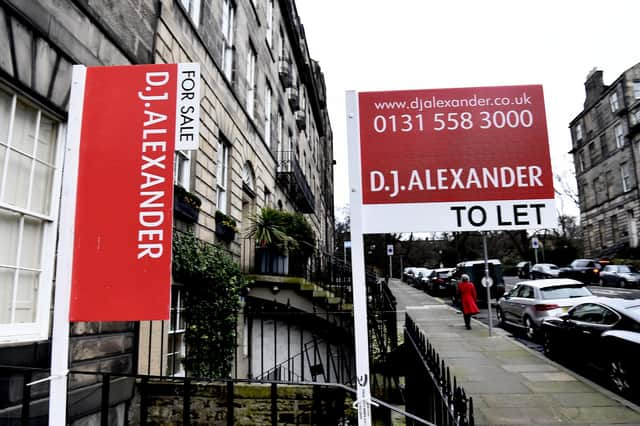We must give tax incentives to landlord ‘veterans’ - David Alexander


Another is a drop in anti-landlord propaganda by the usual suspects, helped by the fact that many landlords have capped or delayed rental payments to help tenants struggling with the job implications of Covid-19.
However, no matter how much sympathy there is for tenants, the time will come when hard decisions have to be made. Landlords cannot continue on the basis of limited rental income indefinitely and evictions, sadly, may eventually increase.
Advertisement
Hide AdAdvertisement
Hide AdOne get-out clause for landlords could be to sell up, depending of course on post-lockdown demand and what effect it has had on residential capital values. However, even before the onset of Covid-19, the net profit on a sale was – in pro rata terms compared with earlier years – gradually becoming less and less, leaving older landlords, especially, with a dilemma.
Historically capital gains tax (CGT) on property sales was not due to be paid until 31 January in the year following the year of disposal. But, from 6 April this year, CGT has to be paid “on account” within 30 days of the disposal. This, of course, is not a tax increase as such but it does put more pressure on landlords as anyone not meeting the deadline will immediately become liable to interest charges and penalties.
The situation facing one of my clients provides a good case in point as to how landlords are being squeezed. She has a small portfolio of properties, which includes a flat purchased in around 1980 for £17,000 (partly through inheritance and partly through bank borrowings), which has recently been valued at circa £200,000.
“Lucky her!” you might reasonably say. However, her purchase was made on the premise that taper relief, which had the potential to substantially reduce liability to CGT on profits from property held over a longer period, would continue indefinitely. But in 2008 taper relief was abolished by the then Labour government, which had substantial implications for the overall return on every landlord’s investment projections.
You see, the capital value of my client’s property did not just “grow like Topsy”. It involved a lot of hard work (and expense) in making the property lettable, regular internal upgrades to suit changing tastes, negotiating the minefield of statutory repairs, initiating safety and other improvements, and experiencing hassle from recalcitrant tenants.
True, she was receiving regular rental income, but a fair amount of this was put back into the property and even after these expenses tax was still due on net income.
She would now like to sell the property, partly to help her children get onto the housing ladder. However, although in reasonably good health, she is in her 70s and aware of another elephant trap – the 40 per cent inheritance tax (IHT) on anything above the nil-rate band allowance on her estate.
Disincentive
And if she dies within three years money gifted to the children could still be taxed at 40 per cent, albeit gradually reducing to 8 per cent if death occurs after seven years. My client is not self-centred. She accepts landlords should pay tax on both income and capital gains but believes the state’s “take” has become unacceptably high and is a disincentive to those starting out.
Advertisement
Hide AdAdvertisement
Hide AdGiven the government is soon going to need all the income it can get, perhaps there is a case for incentivising “veteran” landlords to sell up if they want to. On the face of it more tax relief should mean less tax income but an alternative could be more takings from elsewhere (e.g. stamp duty) and extra money pouring into the consumer economy (leading to more VAT receipts) could result if IHT rules on “gifts” were relaxed.
Perhaps there’s a lesson to be learned from the late Mrs Thatcher whose decision to reduce higher levels of personal taxation actually resulted in an increase in government income.
David Alexander is MD of DJ Alexander
A message from the Editor:
Thank you for reading this story on our website. While I have your attention, I also have an important request to make of you.With the coronavirus lockdown having a major impact on many of our advertisers - and consequently the revenue we receive - we are more reliant than ever on you taking out a digital subscription.Subscribe to scotsman.com and enjoy unlimited access to Scottish news and information online and on our app. With a digital subscription, you can read more than five articles, see fewer ads, enjoy faster load times, and get access to exclusive newsletters and content. Visit www.scotsman.com/subscriptions now to sign up.
Our journalism costs money and we rely on advertising, print and digital revenues to help to support them. By supporting us, we are able to support you in providing trusted, fact-checked content for this website.
Joy Yates
Editorial Director
Comments
Want to join the conversation? Please or to comment on this article.